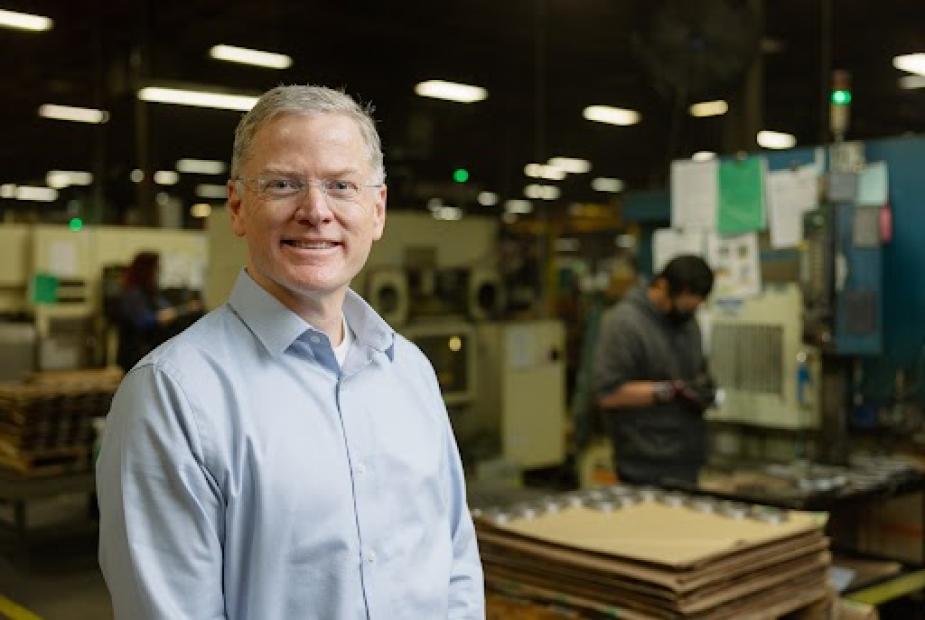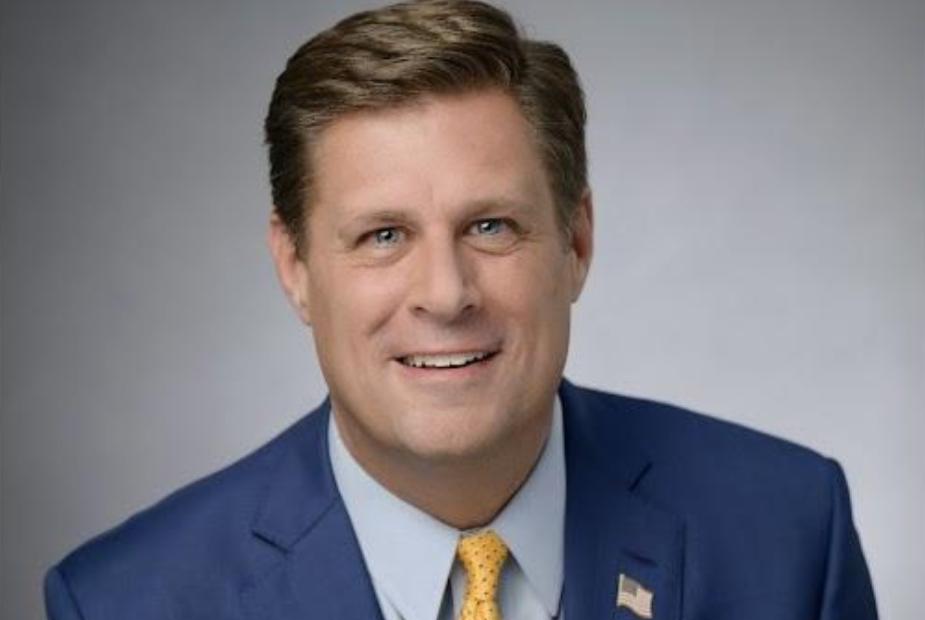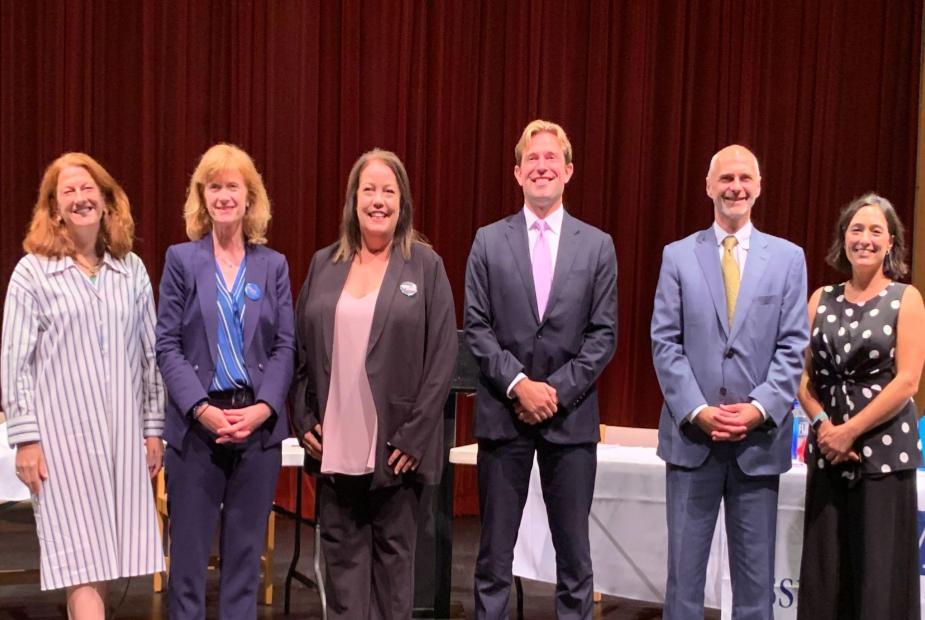Chris Doughty: I’ll Provide Checks and Balances to the Legislature
In blue Massachusetts, where the legislature is overwhelmingly made up of Democrats, the electorate has nevertheless chosen to put a Republican in the corner office for the bulk of the past 30 years. This backstop to one-party rule has involved moderate Republicans like Bill Weld, Mitt Romney, and Charlie Baker. Now, as liberal Democrat Maura Healey is running unopposed in her primary, two candidates will face off Tuesday in the Republican primary: Moderate Chris Doughty and Trump-endorsed Geoff Diehl. Marblehead Beacon spoke with both about their candidacies. Today we report on our meeting with Doughty.
Background: Family and Work
Growing up in California one of nine children, Chris Doughty, 59, is no stranger to large families. The moderate Republican and part owner of Capstan–a major manufacturing company in his hometown of Wrentham–is a parent to six “fully launched” children and grandfather of four. Hayden, who came with his dad to our interview, is serving as his campaign driver this summer before he completes his medical degree at Dartmouth, after which he plans to become a dermatologist focused on melanoma and other skin cancers.
The five other children of Doughty and his wife, Leslie, include three boys and two girls, all of whom have a wide variety of careers and interests. And most have continued on in the tradition of the Mormon church, having spent two-year stints as missionaries, mostly with Latin communities around the world, but also domestically. Many in the family, including Doughty himself, speak Spanish.
Being able to converse in Spanish has certainly helped him understand people at his business, says Doughty, where many come from immigrant backgrounds. He also enjoys being able to communicate with those who would otherwise have a language barrier–particularly in immigrant-strong communities like Lowell and Lawrence.
Doughty spent two years as a missionary in Argentina in the 1980s. “When I arrived, inflation was astronomical, there was food scarcity, unemployment, taxes were over 50 percent, and missionaries walked the dirty streets trying to help people who could only think about where their next meal was coming from.” During that period, he says he “saw the other end of so much being ‘free’ to people.”
In 1992, Doughty and a partner bought into a Massachusetts company after he completed his MBA at Harvard Business School, and in the intervening years has become its president, and has grown Capstan Industries into the East Coast’s largest manufacturer of powder metal parts for the auto, truck, industrial, and appliance industry. “It went from about a dozen employees to about six hundred,” he says. Its Wrentham factory alone employs about 300.
Decision to Enter the Race for the Corner Office
Several years ago, Doughty and his partner sold a large portion of their company and he and his wife decided it was time to “give back” in a different way–by looking to use his skill set in the role of governor. “The Commonwealth of Massachusetts is the state’s largest employer; it’s a large corporation with a $52 billion budget and 44,000 employees,” he says. One must excel at being able to see around corners and engage in “risk mitigation” for all the unknowns that come up. “That’s been my life story in running a large enterprise…and I feel prepared for the role.”
One-Party Government Versus Checks and Balances
“The unenrolleds are the largest party in the state; it’s over 60 percent,” Doughty says, suggesting that if they galvanized for the moderate candidate, there would be a chance to secure the governorship. Should his opponent–Diehl–win Tuesday’s primary, he says, the wider electorate will not vote for him because he’s too conservative, and that would leave the Commonwealth under the executive and legislative thumbs of Democrats. “Massachusetts is a good state,” he says, “but it’s not an accident; it’s because we’ve kept a balance.”
Green Energy and Utility Costs
Doughty plans to be a leader in reducing the carbon footprint in our state, but right now, he says, “our utility rates are in the top two or three in the nation,” he says, which drives out investment dollars, jobs, and opportunity. “I talk to a lot of CEOs who say their businesses are doing well, but they’re not investing in Massachusetts; they’re investing in Texas, North Carolina, Virginia, or Tennessee because the utilities just cost too much here.”
Doughty plans to bring costs down while also pursuing smart energy policy. “We must have both if we want to be prosperous,” he says, blaming Healey for not letting the state utilize pipelines for natural gas. “We’re dirtier than many states because now we have to use oil in our homes and to keep the grid running.”
Housing
Few disagree that housing has become unaffordable in many parts of Massachusetts. Doughty would divide the Secretary of Housing and Economic Development into two jobs. “It doesn’t make sense,” he says,” that the person responsible for economic development–which refers to selling our state–is also responsible for housing.”
Red tape for building permits and associated costs are also enormous impediments to incentivizing builders to build reasonably priced homes, he says. “Developers tell me that if you build a $700,000 condo in Massachusetts, you spend about $200,000 on regulation and paperwork between the municipality, the state, and the bank. I’d like to streamline and simplify the regulations, reducing those costs by half.”
The MBTA
Part of Doughty’s plan for housing dovetails with his plans to overhaul the MBTA, both of which require well-trained workers. His goals include making a strong pathway for the trades so that people can more easily and with less bureaucracy, become plumbers, carpenters, and electricians. “The MBTA is the lifeblood of the city,” he says, and when there is a hiccup and people are late to work,” something is failing on a large scale. “I have a unique background running a large industrial enterprise with old equipment.”
With ticket sales down 30 percent and costs up 15 percent, he says, the MBTA is financially distressed, with enormous overhead and an insufficient number of workers. “‘I’m going to fix it in the rail yard, not the board room,’ is one of my favorite sayings, as this happens often in the business world,” Doughty offers. “Companies get too much overhead and not enough electricians, mechanics, and people doing the work.”
He disagrees with Healey’s stated goals to fire top management. “I would never throw a state employee under the bus publicly,” he says. Her showmanship, he says, demonstrates “a lack of managerial experience,” as does her blanket statement about giving away free bus and subway fares.” “This is a pander for votes that sets up expectations,” Doughty suggests. “We have to figure out how to replace the revenue lost after Covid, which is about 40 percent, and stabilize things before talking about giveaways.”
Healey also talks of spending tax dollars on expansion, notes Doughty. While expansion could be positive, he believes the key to success in transportation is first creating redundancy. “In New York, when a train fails, people don’t notice it because they just put another train on the track.”
The performative acts of ribbon cutting and making big announcements do not make a good leader, says Doughty. “We need someone with operational skills to come in and do the quiet, hard work,” he says. “The phrase, ‘We’re going to lay another track along the side of this track’ is not exciting,” he says, but such work would be a cornerstone of an MBTA upgrade. “What’s exciting is being the best-run transit system in America.”
Doughty’s website may be found here. The primary is on September 6, 2022.









